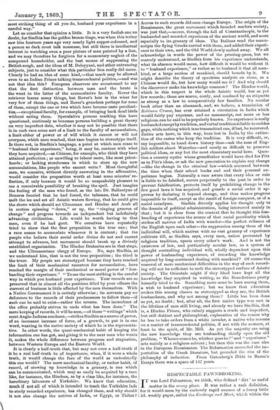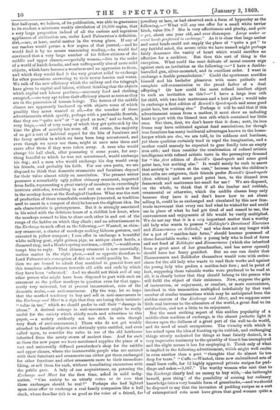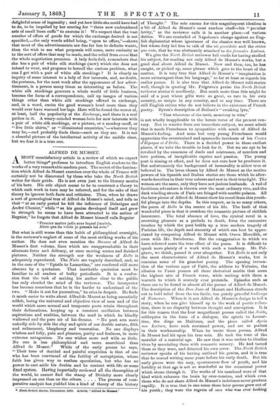RESPECTABLE PAWNBROKING.
IT was Lord Palmerston, we think, who defined 'dirt' as useful matter in the wrong place. It was rather a rash definition, for it would seem by the curiously rapid success of a funny little 2d. weekly paper, called the Exchange and which within the first half-year, we believe, of its publication, was able to guarantee to its readers a minimum weekly circulation of 10,000 copies, that a very large proportion indeed of all the curious and ingenious appliances of civilization are, under Lord Palmerston's definition. dirt,—are, at least, useful matter in the wrong place. If any of our readers would peruse a few copies of that journal,—and he would find it by no means unamusing reading,—he would feel convinced that a very large number of his fellow-citizens of the middle and upper classes,—especially women,—live in the midst of a world of knick-knacks, and not unfrequently also of more solid objects, which have become a weariness and an oppression to them, and which they would find it the very greatest relief to exchange for other possessions answering to their newer fancies and wants. We talk of the new efficiency which the railway and the telegraph have given to capital and labour, without thinking that the objects which capital and labour produce,—necessary food and clothing excepted,—are very apt to lose their efficiency almost as soon as they are in the possession of human beings. The houses of the middle classes are apparently lumbered up with objects some of which possibly they never wanted at all,—for the number of those advertisements which specify, perhaps with a pardonable flourish, that they are "quite new" or "as good as new," and so forth, is very large,—and of very many of which they get quite sick by the time the gloss of novelty has worn off. Of course, the majority of us get a sort of habitual regard for the bits of furniture and the fancy articles to which we have been long accustomed, and even though we never use them, might at once miss them and crave after them if they were taken away. A .man who would change his hall clock, after possessing it some years, for anything fanciful to which he was not accustomed, would exchange his dog ; and a man who would exchange his dog would swop his friends, and probably his faith. For our own parts, we are disposed to think that domestic ornaments and furniture depend for their value almost solely on association. The present writer possesses a remarkably ugly yellow chimney ornament, imported from India, representing a great variety of monkeys in exceedingly intricate attitudes, wreathing in and out on a tree such as that in the monkey-home at the Zoological Gardens. What was the cost of production of those remarkable monkeys (executed, as tradition used to assert in a compost of rice) he has not the slightest idea. Its sole characteristic is grotesqueness. But it is strongly associated in his mind with the delirious hours of a childish low fever, when the monkeys seemed to him to chase each other in and out of the rungs of the ladder on which they climb ; and no advertisement in the Exchange to such effect as the following,—" Wanted, as chimney ornament, a cluster of monkeys making hideous gestures, and executed in yellow compost ; I can offer in exchange a beautiful white milking goat, eight guinea pigs, an antique claret bottle, a diamond ring, and a Ileale's spring mattrass,-9999,"—would even tempt him to reply. That chimney ornament is now essentially, useless matter in the right place,—and as opposite therefore to Lord Palmerston's conception of dirt as it could possibly be. But then we are bound to admit that mankind in general have not this tenacious adhesiveness towards old odds and ends by which they have been 'educated.' And we should not think evil of any other person who might have been disposed to part with such an ornament as the yellow monkeys in question even for that apparently very universal, but at present inconvenient, coin of the domestic realm,—an anti-maccassar. (By the way, let us hope that the marked tendency to buy and sell in anti-maccassars in the Exchange and Mart is a sign that they are losing their intrinsic "value in use," which we should prefer to call their "damage in abuse." A decimal coinage in anti-maecassars might be really useful for the society which chiefly reads and advertises in this paper, — a society evidently not too rich in coin though very flush of anti-maccreisars.) Those who do not get weakly attached to familiar objects are obviously quite entitled, and even called upon, to consider the value in use of the old heirlooms inherited from the musty stores of ancient time. And for such as these the new paper we have mentioned supplies the place of a vast and universally diffused pawnbroker's shop for the middle and upper classes, where the innumerable people who are satiated with their furniture and ornaments can either get them exchanged for other furniture and other ornaments more to their immediate liking, or sell them for cash, without humiliating encounters with the public gaze. A lady of our acquaintance, on perusing the Exchange and Mart for the first time, asked in mild indignation, "Can society be so utterly rotten at its core that these exchanges should be real ?" Perhaps she had lighted upon some offer to exchange a real family companion like a hall clock, whose familiar tick is as good as the voice of a friend, for
jewellery or lace, or had observed such a form of hypocrisy as the following,—" What will any one offer for a small white terrier bitch, value 30s. ? She is very affectionate and plucky, and quite a pet, about one year old, and over distemper. Large amber or coral beads preferred in exchange." As it is clear that large amber and coral beads could not supply the place of "quite a pet" to any faithful mind, the severe critic we have named might perhaps fairly denounce the vanity of heart which would sacrifice an affection for a necklace. But then this sort of thing is the exception. What could the most delicate of moral censors urge against such an invitation as the following :—" I have a doublebarrelled gun, silver-mounted, and in excellent order. I want in exchange a double perambulator." Could the sportsman sacrifice himself and his bachelor pleasures with more pathetic and complete self-renunciation to the proud father of a dual offspring ? Or how could the most refined intellect object to such an invitation as this?—" I have a large iron crib for child, with two hair mattresses and a hair pillow ; would take in exchange a first edition of Bewick's Quadrupeds and some good point lace, but nothing else." Perhaps it will be said that if this advertisement comes from a mother, it must show an unfeeling heart to part with the blessed iron crib which contained her little ones. But then, first, we don't know that it does; next, its iron frame may have militated against fond associations, for though iron furniture has many incidental advantages known to the housekeeper which are due, we are told, to its coldness and hardness, yet these qualities certainly tend to repel the imagination, and a mother could scarcely be expected to gaze fondly into an empty iron crib ; and then consider the combination of refined artistic intelligence with refined artistic taste in the peremptory demand for "the first edition of Bewick's Quadrupeds and some good point lace, but nothing else." It would surely be rash to assert that society is "rotten at the core," because when the children's iron cribs are outgrown, their friends prefer Bewick's Quadrupeds (first edition) and some good point lace, to the dimmed iron framework and mattresses too small for use? We are disposed, on the whole, to think that if all the lumber and rubbish, ornamental or otherwise, which the middle classes keep only because they have it and don't know how to set about selling it, could be so exchanged and circulated by this new freetrade movement that every one had what he wished for and could use in place of what he had got tired of and ceased to use, the conveniences and enjoyments of life would be vastly multiplied. We do not say that it is a very important matter that a worthy old lady who wants to possess "Zollikofer's Devotional Exercises and Zimmermann on Solitude," and who does not any longer wish for a pot of "maiden-hair ferns," should become possessed of those formidable works ; while a young lady who is fond of ferns and not fond of Zollikofer and Zimmermann (which she inherited from a great aunt of her grandmother, and has never opened) should have her fancy gratified. But no one can doubt that Zimmermann and Zollikofer themselves would vote with enthusiasm for the old lady who wants to read their works and against the young lady who prefers a maiden-hair fern ; and in point of fact, supposing these valuable works were produced to be read at all, it is clearly better that they should belong to the person who will fulfil the object of their existence. Now, suppose the gain of instruction, or enjoyment, or comfort, or mere convenience, involved in this transaction multiplied indefinitely by that vast number of similar transactions which may be anticipated from the sudden success of the Exchange and Mart, and we suppose some little real increase to the education of the world, a great deal to its satisfaction, and not a little to its enjoyment.
But the most striking aspect of this sudden popularity of a middle-class medium of exchange, is the almost pathetic light it throws upon the dullness of a great part of the well-to-do world, and its need of small occupations. The vivacity with which it has seized upon the idea of hunting up its rubbish, and exchanging things utterly undesired for things at least faintly desired, is a very impressive testimony to the quantity of time it has unemployed and the slight means it has for employing it. Think only of what is implied in the following advertisement, which might well excite in even another than a poet "thoughts that do almost lie too deep for tears." "Cuffs :—Wanted, three new embroidered sets of small linen cuffs, for 12 highly approved private recipes for puddings and cakes.-3,067." The worthy woman who sent that to the Exchange clearly had no money to buy with,—ehe bethought herself, poor thing ! of the possibility of coining her culinary knowledge into a very humble form of greenbacks,—and we should be disposed to say that the invention of pudding recipes as a sort of extemporized coin must have given that good woman quite a delightful sense of ingenuity ; and yet how little she could have had to do, to be impelled by her craving for "three new embroidered sets of small linen cuffs" to exercise it We suspect that the vast number of offers of goods for which the exchange desired is not specified,—the only words added being, "open to offers,"—shows that most of the advertisements are due far less to definite wants, then the wish to see what proposals will come, mere curiosity as to the sort of offers that may be made, and the relief from ennui that the whole negotiation promises. A lady feels dull, remembers that she has a pair of white silk stockings (new) which she does not intend to wear, and proposes to herself the curious problem, what can I get with a pair of white silk stockings ? It is clearly an inquiry of some interest to a lady of few interests, and, no doubt, the postman, for the next week after the appearance of her advertisement, is a person many times as interesting as before. The white silk stockings generate a whole world of little business, become the focus of a correspondence, call up images of various things other than white silk stockings offered in exchange, and, in a word, excite the good woman's head more than they would ever have warmed her legs. Here will be found the secret of, at least, half the popularity of the Exchange, and there is a real pathos in it. A weary-minded woman baits for new interests with • a pair of white silk stockings, or a picture, or a monkey-muff, or 4' five little shirts," or "illuminated eccentrics,"—whatever they may be,—and probably finds them—such as they are. It is not a cheerful picture of the intellectual activity of the middle class, but we fear it is a true one.












































 Previous page
Previous page